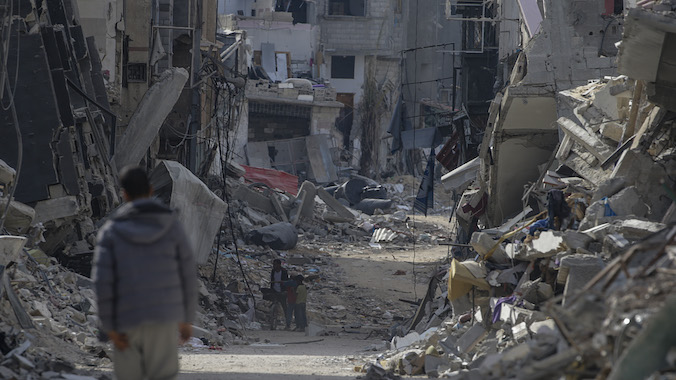Who Gets to Rebuild Gaza?
Photo by MOHAMMED SABER/EPA-EFE/Shutterstock
It is an undeniably ghoulish undertaking to ponder the rebuilding of the Gaza Strip as its destruction is ongoing. With tens of thousands dead, millions on the verge of starvation, and Israel still promising an invasion of the southern city of Rafah “with or without a deal” to end the fighting and release hostages, the details of how to turn that rubble-strewn landscape into a livable or even thriving region seem impossibly far off and unimportant. But according to reporting from the New York Times this week, an international group is engaged in exactly that unthinkable effort.
The group, known as Palestine Emerging, has used the Times story as a sort of soft launch, now with a website and blueprint for their plans available online. And there is a logic to their efforts: the war will end at some point, and something has to come afterward. Planning ahead for the aftermath of an ongoing catastrophe isn’t inherently a bad thing, even as it feels viscerally like a callous disregard of current suffering. But it also raises the question of who exactly gets to be in that room (they met first in London in December, and since in Washington and Ramallah, in the West Bank), and why they want to be there.
The Times reported that senior officials from American and European economic development agencies are involved, as well as executives from finance and construction companies based across the Middle East. The chairman of the Bank of Palestine is in, as is a board member of a medical provider in the West Bank. Then there’s the principal for a London-based urban development firm, and two partners from McKinsey & Company, whose long list of clients has included fossil fuel and tobacco companies and is somewhat fresh off a $600 million settlement for helping “turbocharge” the opioid crisis. They are, apparently, all only involved under their own aegis and not as representatives of their various organizations.
There is surely a strong element of humanitarian feeling in these meetings and plans — and all involved are quick to point out that the first priority is stopping the war and providing immediate aid to the citizens of Gaza — but it can’t be ignored that there is money at stake as well. The World Bank recently estimated that the cost of the damage to critical infrastructure in Gaza has exceeded $18 billion; a U.N. agency thought rebuilding costs had topped $20 billion back in mid-February.
The new plan itself involves some big-ticket projects, like a deepwater port on an artificial island made from cleaned-up rubble, a desalination plant, and a transportation corridor connecting Gaza to the West Bank (the political challenge obvious to such an idea is purposefully left to others). If that money and more eventually gets spent to rebuild existing infrastructure along with those swing-for-the-fences ideas, the McKinseys of the world are going to want a piece.
To the C-suite class, this seems like just a matter of obvious due course. Trump senior advisor and soldier cosplay enthusiast Jared Kushner casually mused to a Harvard Kennedy School audience about how “Gaza’s waterfront property could be very valuable” in March. Even within the group’s new blueprint, the language might elicit some cringes: “How can we create the most value for the greatest number of Palestinians?” the document asks, a sentence glistening with consulting firm ooze.
If the stuff does get built, and there really is value for the people who live there, then it matters less to which companies the dollars flow — but the world doesn’t have a great track record there. Between 2003 and 2014 more than $200 billion poured into the rebuilding of Iraq; the result was huge profits for some big American contractors like Halliburton and a “critical” eye from the Iraqi people.
It’s probably good that someone is thinking about what comes next in Gaza, and trying to mobilize international development banks and other funding sources to be ready with the billions when the bombs finally stop falling. But with the big players already staking out corners of a theoretical rebuild, it’s not hard to imagine some unpleasant outcomes radiating out from a new Gaza.